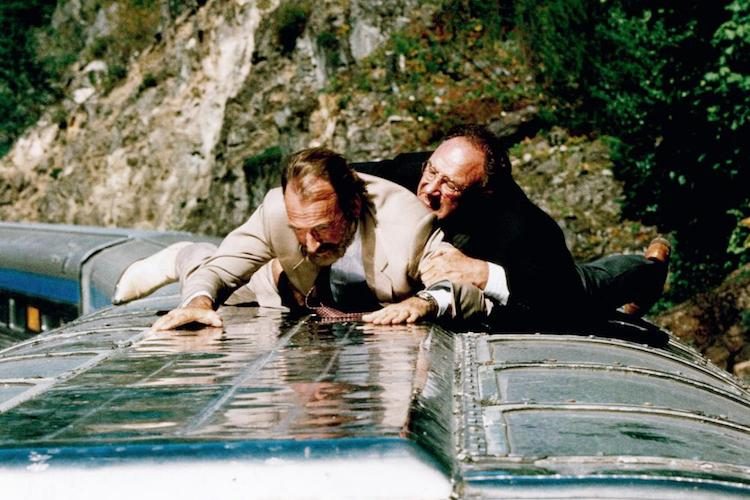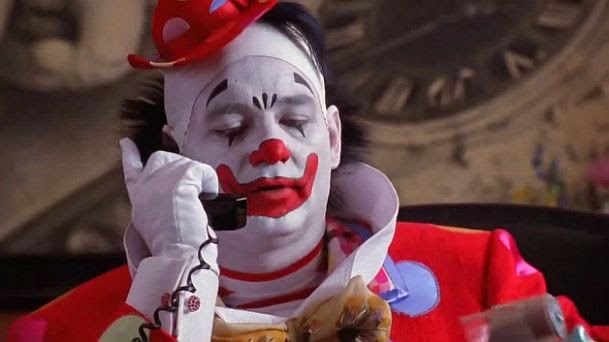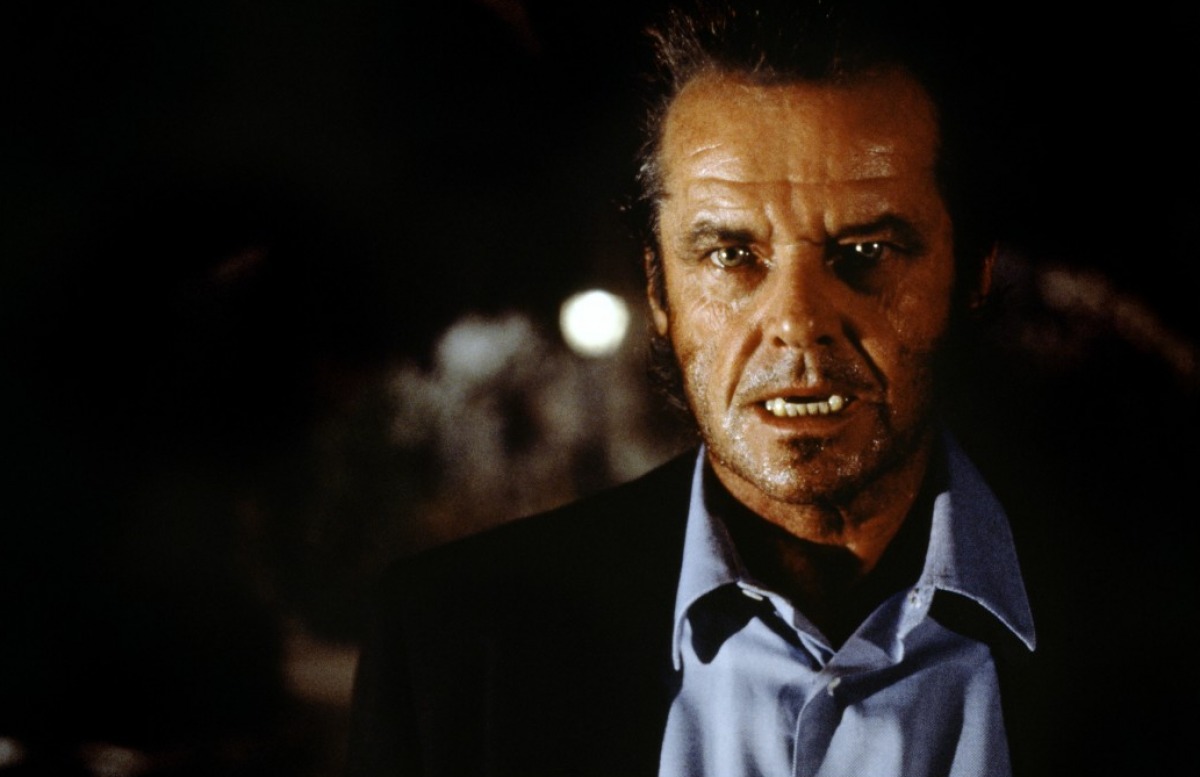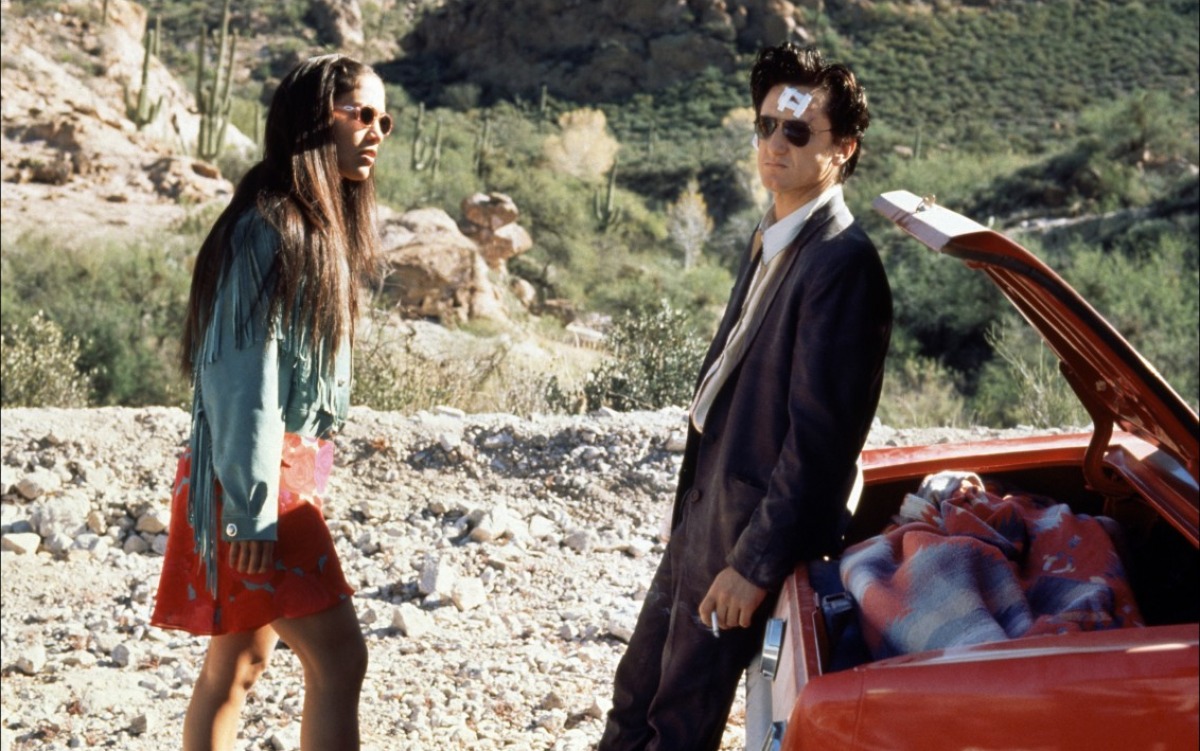6. Narrow Margin (1990)

Gene Hackman was back in star mode for Narrow Margin (1990), a thriller directed by Peter Hyams and co-starring Anne Archer. Hackman plays Robert Caulfield, an LA deputy district attorney and Vietnam vet, who is taking Carol (Archer) back to America where she will hopefully testify against a mob boss. After the perpetrators of the murder she witnessed track them down, Robert and Carol board a train from Canada to America. But then the duo realise hitmen are on board, and they spend the next day going cross country trying to keep alive.
Genuinely gripping, Narrow Margin is a damn fine thriller, wonderfully shot and expertly played by all involved. Fans of Gene Hackman in intense mode will be pleased, and he definitely delivers the goods. Indeed, the character might just be one of his most memorable from this era. He has the Hackman cynicism, the cocky humour and thorough forthrightness, but a lot of the time he’s basically a slave to the film’s tension, which tightens as it goes on.
Yet there is room for Hackman quirkiness and he has many stand out scenes; when he sits with the two hitmen for instance, mocking them lightly; when he confronts one with the “fake gun”, and takes great delight in telling the killer that it’s actually a water pistol; the scene at the train station too, where he ends up flying through a window. Within the confines of this slick genre piece, Hackman is more convincing an action hero, albeit one wearing a suit and tie, than any muscle bound herculean warrior.
Unfortunately the film was not greeted with too much enthusiasm, either by the critics or movie-goers, but thirty odd years on it remains a solid slice of intrigue. In fact, it’s arguably one of Hackman’s most enjoyable pictures.
7. Quick Change (1990)

One of the most unfairly buried gems in the whole of Bill Murray’s filmography, Quick Change is an essential crime comedy that has been in need of a dusting off and reappraisal for some time now. Co-directed by Murray himself with Howard Franklin, it’s an endlessly entertaining, sharp witted, and just plain funny movie of the kind we aren’t treated to these days.
It stars Murray as Grimm, a man who we first meet when he’s in the process of robbing a bank while dressed as a clown, the kind of clown who’s “crying on the inside”. In one of the finest opening sequences in Murray’s career, Grimm, who wishes to be known as Skip by the police when conferring with Chief Rotzinger (played brilliantly by Jason Robards), winds up sneaking out of the bank, along with his two accomplices (Phyllis, played by Geena Davis, and Loomis, played by Randy Quaid), disguised as a whining hostage. The trio then attempt to escape New York, but the potentially simple plan of getting to the airport is complicated by a series of obstacles put in their way.
First, they get lost in a dodgy neighbourhood, then they are almost robbed of their bank loot by a conman. Later they are involved in a car crash with a cab driver, and become entangled with the mob before getting on to a bus they hope will take them to the airport, all the while Rotzinger is on their tail and getting closer and closer to putting them behind bars. To add to the complication is the fact that Phyllis is pregnant to Grimm, though she hasn’t told him yet, and also that Loomis, not the sharpest knife in the drawer, becomes increasingly injured as their bad luck continues. Will they get away with their million dollars? Or will Rotzinger get his man?
Sadly, despite some strong notices, Quick Change was not a hit, failing to make back its $17 million at the box office. That said, it has endured in its own exclusive way, and though nowhere near as known as it should be, it has a special place with Murray fans and a healthy cult following. The fact it’s the only film to be directed by Bill Murray though, and that it’s so damn good, makes you wonder why the movie doesn’t get more attention.
8. Wolf (1994)

Mike Nichols surprised movie goers everywhere when, in 1994, he directed the horror drama Wolf, which stars Jack as Will Randall, an editor for a publishing company who is bitten by a wolf during a drive home. Simultaneously, Will is stripped of his professional role by tycoon Raymond Alden (Christopher Plummer) and learns his wife is having an affair with the young man who has replaced him, Stewart Swinton (played gloriously by James Spader). As his life unravels, Will begins to experience life as a werewolf, both in the wild and in his professional life, where he establishes his domination in various ways.
Wolf is one of those films which, though a hit in the mid nineties, has kind of faded away into the mass of 90s horror films, if that’s what Wolf really is; which is indeed a shame, as it’s one of the more intelligent, original and considered examples of the werewolf genre. The clever thing is that Nichols and Nicholson use the dominance of a wolf and his more competitive characteristics to mirror the life of a professional in a cut throat world, where animal instinct and macho posturing are the order of the day, and can make or break a man. The wolf is a metaphor for the animal in all of us, of course.
Wolf is a sharp, funny, poignant film, boasting fine work from the whole cast. Though Jack is very much the star, the film would have lost much without Michelle Pfeiffer, who is particularly strong (as ever), as the daughter of Jack’s ruthless boss. Pfeiffer is in many ways the conscience to Jack’s often outdated male, and she calmly provides the film with a sort of moral compass. Every eye rolling stereotype is questioned, often with a gesture and sly remark, by a Pfeiffer at her most charismatic. As great as Jack is, Pfeiffer’s subtle performance is what impresses the most. She also gets the last shot of the movie, perhaps the finest single image in the whole thing.
9. The Crossing Guard (1995)

In the mid nineties, Jack Nicholson teamed up with a man that a few critics defiantly called his directorial soul mate. The actor Sean Penn directed his first feature in 1991, The Indian Runner, a gritty bar room-based drama that impressed critics. He then wrote a script called The Crossing Guard, all about a man called Freddy Gale (Nicholson) who has gone on a downward spiral after a driver killed his daughter five years earlier. Now separated from his wife Mary (Anjelica Huston), he swears to kill the man who did him wrong. John Booth (David Morse) is the man who did the deed. He leaves prison and lives in a mobile home in his parents’ drive way.
Obsessed with taking him out and releasing himself from the psychological purgatory the incident has put him in, Freddy struggles to kill the man upon their first clumsy meeting. He falls over in the door way and realises he hasn’t even loaded the gun. Booth tells him that he will be here, he’s not going anywhere, and he will not tell the police. He does, however, leave it up to Freddy, asks for a couple of days for him to consider the man’s life, and if killing him will really solve anything.
As one might expect, Jack’s character has become an alcoholic womaniser. While his wife has moved on and remarried (Robbie Robertson plays her new husband), he is living in the past, neglecting the two children who have lived, who now stay with their mother and stepfather, and obsessing over a ghost, a dark memory from the past. Can he not be freed until he avenges the death? In the mean time, he frequents a seedy strip club, getting loaded with the same bunch of weathered, guffawing sleaze bags every night.
A riveting drama, gripping and superbly acted, it’s a lost gem in Nicholson and Penn’s careers. One also has to mention how strong Anjelica Huston is in her supporting role, and just how electric her confrontational scenes with Jack are. A lost bit of movie treasure, The Crossing Guard needs a re-evaluation.
10. U Turn (1997)

U turn is quite often seen as Oliver Stone’s great misguided detour of the 1990s, the film where he got it all wrong, veered off the road and crashed explosively into the ditch of cinematic failure. Road-themed metaphors aside, despite its reputation as a dud, U Turn, like most movies, is one that you either “get” or you don’t. The same way you either grasp or don’t grasp the fact that Stone’s W is a comedic satire on Bush; that Natural Born Killers is a satire on the media’s hunger for ratings at any cost; or that World Trade Center is not a political story, but a human one.
In many ways U Turn is Stone’s most harsh film. Shot on reversal stock film, it has a jagged, specifically non-beautiful look to it. It’s a film that gets off on its own weirdness, with Stone clearly enjoying himself while exploring the worst facets of human nature; greed, lust, cowardice, mistrust. It’s all here, in a star studded thriller that acts as a vehicle for nobody, where each actor plays unsavoury to the maximum with a distinct lack of vanity.
The film, adapted by John Ridley from his own novel, Stray Dogs, stars Sean Penn as Bobby, a sleazy drifter down on his luck, arriving in a back-end-of-nowhere town in Arizona. His car has broken down and he has no money to pay the local mechanic, Darrell (a vile but brilliant Billy Bob Thornton), to fix it. While there, he meets and often rubs up the wrong side of various odd balls and weirdos. There’s the “blind” Indian played by Jon Voight; the quiffed, pseudo- tough guy, Toby TNT (Joaquin Phoenix), who always thinks everyone is after his girl (Claire Danes) and will fight any man in her honour; then there’s the seedy, mistrustful sheriff, played by Powers Boothe.
On top of these characters are the warped husband and wife, Jake and Grace McKenna (Nick Nolte and Jennifer Lopez), who Bobby meets independently. Seeing as Bobby owes a great deal of money to a mobster, who as it happens is on his tail, he needs cash fast. He accepts the offer from both Jake and Grace to kill the other, naturally falling for the latter. As time runs out for Bobby and the mobsters get closer, his car still stuck in the garage and trouble piling up to his ears, this desperate man who’s taken a fatal wrong turn realises he has to make a vital decision – and fast.
U Turn is a fast-paced treat, a murder and sex laced thriller acted with perfection by the stunning cast, all of whom hand over their ego at the door. Sean Penn, as ever, is fantastic in the lead, a man we follow through the chaos he has found himself in. He is not the most ideal man to follow, however, a sleaze ball out of luck who seems to find himself in more and more trouble as the film goes on.
While it never set out to say anything profound, or satirise, poke, or provoke, U Turn is just a good old fashioned entertaining thriller. And when I say old fashioned, it doesn’t feel remotely out-dated or tired out. It feels like it was shot yesterday, looks urgent, grabs you by the scruff of your neck and pulls you into the screen. It lacks the satire of Natural Born Killers, but feels just as vital.